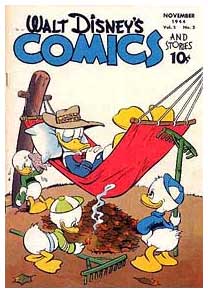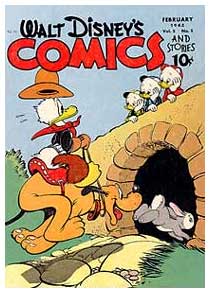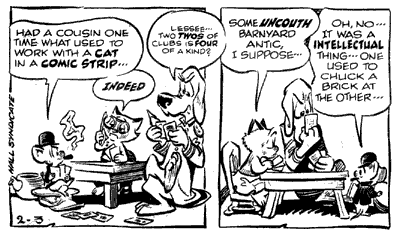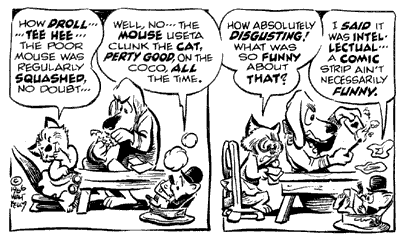Walt Kelly (a diminutive of Walter Crawford Kelly, Jr.) is a comic artist who was influenced by his father, who painted backgrounds for the theater. Two other strong influences on his work were Al Capp and T.S. Sullivant. Walt Kelly started his career as a reporter and cartoonist for the Bridgeport Post, his local newspaper. In 1935, he joined the Walt Disney Studios, where worked as a story man and animator on movies like 'Pinocchio' (1940), 'Fantasia' (1940) and 'Dumbo' (1940). One of Kelly's assistants at Disney was Bob Moore. In the mid-1930s, Kelly did his first comics work at the future DC Comics. Kelly left the Disney studios in 1941, after taking part in a strike.
Covers by Walt Kelly for Walt Disney's Comics.
Kelly then found a job at Dell Publishing, where he drew comics with licensed characters. Kelly did the lead series in the MGM title Our Gang Comics, and contributed to Dell's Disney titles. He did several classic covers for Walt Disney's Comics and Stories, and wrote and drew stories with 'Donald Duck', as well as the 'Three Caballeros' comics adaptation. He was the artist of the pantomime 'Gremlins' comic strip, which appeared as a back-up comic. Another comic by Kelly for Dell was 'The Adventures of Peter Wheat' (1950-1956), later continued by Al Hubbard.
Kelly also contributed to Santa Claus Funnies and Fairy Tale Parade. In a more adult register, he drew 'Seaman Sy Wheeler' in Camp Comics and 'Pat, Patsy and Pete' in Looney Tunes. 'Pat, Patsy and Pete' was originally created by Win Smith.
'Gremlins'.
It was during his time at Dell that Kelly created the character of Pogo, a humourous possum. The character first appeared in Dell's Animal Comics, as a secondary character in the 'Albert the Alligator' strip. It didn't take long until 'Pogo' became the comic's leading character. After the second World War, Walt Kelly became artistic director at the New York Star, and turned Pogo into a daily strip. When the Star folded in 1949, Bob Hall took 'Pogo' into syndication, so that the strip soon appeared in hundreds of newspapers. Until his death in 1973, he dedicated himself completely to this series, which has become a classic in comics. In 1954, he was nominated president of the National Cartoonists Society.
'Pogo'.
Playing with the codes of the genre, Walt Kelly developed a personal oeuvre that blended social satire, nonsense and poetry. He made an essential contribution to American "intellectual" comics. Among his assistants were Dan Noonan.
After Kelly's death, the strip was continued by his widow Selby Kelly, Henry Shikuma, Willie Ito and Don Morgan. His son Stephen Kelly took on the writing duties. In 1989, the strip was shortly revived by Larry Doyle and Neal Sternecky, and in 1992/93, Kelly's daughter Carolyn Kelly drew the 'Pogo' strip for a while.
'Pogo' was parodied by Harvey Kurtzman and Wallace Wood in Mad Magazine (issue #23, May 1955). Roger Brunel also drew a porn parody of 'Pogo' in 'Pastiches 2' (1982). The French magazine Pogo-Poco, edited by Moliterni, was once forced to changed their title to Poco, after copyright claims by Kelly on the name "Pogo".
In the United States, Walt Kelly was an influence on Joel Beck, Nancy Beiman, Mark Campos, Frank Cho, Robert Crumb, Will Elder, Jane Elliott, Jules Feiffer, Mike Fontanelli, Guy Gilchrist, Larry Gonick, Matt Groening, Stuart Hample, Lynn Johnston, Denis Kitchen, Bobby London, John Blair Moore, Joe Murray, Dan Noonan, Ben Sargent, Bob Scott, Walt Scott, Dana Simpson, Jeff Smith, Irving Spector, Neal Sternecky, Steve Stiles, Garry Trudeau, Bill Watterson and S. Clay Wilson. 'Muppets' creator Jim Henson based some of his earliest designs of the Muppets on the design of 'Pogo' characters. In Canada, Walt Kelly was cited as an inspiration by John Kricfalusi. In the Netherlands, Kelly inspired Evert Geradts, Stefan de Groot, Frank Hasselaar, Daan Jippes, Fred Julsing, Jr., Marten Toonder and Gerben Valkema. Dick Matena's 'Polletje Pluim' also borrowed from 'Pogo'. Kelly additionally found admirers in Belgium (GoT (Gommaar Timmermans), Michel Greg), Denmark (Børge Ring), Finland (Kari Korhonen), France (René Goscinny, Nikita Mandryka (his character Le Concombre Masqué was modeled after Albert the Alligator) and Albert Uderzo), Mexico (Juanele Tamal) and The United Kingdom (Harry Hargreaves (his comic 'The Hayseeds' was directly inspired by it), Jonathan Lemon, Richard Yeend).
'Pogo' comic book.
'Pogo'.








